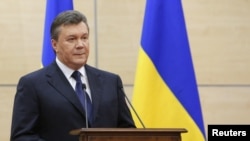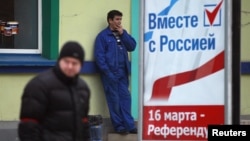U.S. President Barack Obama hosts Ukraine's interim prime minister, Arseniy Yatsenyuk, at the White House Wednesday.
The White House says the president will stress his strong support for the Ukrainian people and talk about economic aid. The United States has already pledged $1 billion in aid to Ukraine.
Yatsenyuk's visit comes just a day after the U.S. House of Representatives voted 403 to six to condemn Russia for violating Ukraine's sovereignty in Crimea. The resolution also calls for international monitors to go to the region.
U.S. Secretary of State John Kerry held another telephone call with Russian Foreign Minister Sergei Lavrov Tuesday on the ongoing situation in Ukraine.
A State Department spokeswoman said Kerry told Lavrov that it is "unacceptable" for Russian forces and "irregulars" to keep taking matters into their own hands in Ukraine. Kerry said the U.S. respects the fact that Russia has interests in Crimea, but added that it does not justify military intervention in the region, particularly the use of force.
The White House says there are no credible reports that the rights of ethnic Russians in Crimea and eastern Ukraine are being violated.
Giving money to 'bandits'
Also Tuesday, ousted Ukrainian president Viktor Yanukovych emerged again in the southern Russian city of Rostov-on-Don to blame the interim government for Crimea's moves to break away from Ukraine. Yanukovych said he is still president and commander-in-chief. He called the interim leaders in Kyiv "extremists" and denounced presidential elections, set for May 25, as illegal.
Yanukovych also criticized the United States for promising monetary aid to Ukraine's new government, and said he would appeal to the U.S. Congress and Supreme Court to assess the legality of giving such aid, insisting U.S. laws prohibit giving money to "bandits."
Confusing referendum ballot
Meanwhile, Crimea, whose regional legislature adopted a "declaration of independence" Tuesday, is moving ahead with plans to hold a referendum on the peninsula's unification with Russia. However, Ukraine's parliament warned Tuesday that the Crimean Assembly faces dissolution unless the March 16 vote is called off by Wednesday.
A sample of the ballot published on the assembly's website appears to offer no option for staying with Ukraine for those voters who might be opposed to joining Moscow. Both options appear to result in Crimea passing under Russian control.
Crimea closed its airspace to commercial flights but allowed several planes from Moscow to land, Reuters reported, five days ahead of the referendum that the government in Kyiv and its Western backers say is illegal.
French Foreign Minister Laurent Fabius told France Inter radio Tuesday the West could impose sanctions against Russia as early as this week if Moscow does not work for calm in Crimea.
And, after repeatedly being denied entry to Crimea, an unarmed OSCE military observer mission is scheduled to visit other parts of Ukraine, including Kyiv, soon.
Some information provided by Reuters.
The White House says the president will stress his strong support for the Ukrainian people and talk about economic aid. The United States has already pledged $1 billion in aid to Ukraine.
Yatsenyuk's visit comes just a day after the U.S. House of Representatives voted 403 to six to condemn Russia for violating Ukraine's sovereignty in Crimea. The resolution also calls for international monitors to go to the region.
U.S. Secretary of State John Kerry held another telephone call with Russian Foreign Minister Sergei Lavrov Tuesday on the ongoing situation in Ukraine.
A State Department spokeswoman said Kerry told Lavrov that it is "unacceptable" for Russian forces and "irregulars" to keep taking matters into their own hands in Ukraine. Kerry said the U.S. respects the fact that Russia has interests in Crimea, but added that it does not justify military intervention in the region, particularly the use of force.
The White House says there are no credible reports that the rights of ethnic Russians in Crimea and eastern Ukraine are being violated.
Giving money to 'bandits'
Also Tuesday, ousted Ukrainian president Viktor Yanukovych emerged again in the southern Russian city of Rostov-on-Don to blame the interim government for Crimea's moves to break away from Ukraine. Yanukovych said he is still president and commander-in-chief. He called the interim leaders in Kyiv "extremists" and denounced presidential elections, set for May 25, as illegal.
Yanukovych also criticized the United States for promising monetary aid to Ukraine's new government, and said he would appeal to the U.S. Congress and Supreme Court to assess the legality of giving such aid, insisting U.S. laws prohibit giving money to "bandits."
Confusing referendum ballot
Meanwhile, Crimea, whose regional legislature adopted a "declaration of independence" Tuesday, is moving ahead with plans to hold a referendum on the peninsula's unification with Russia. However, Ukraine's parliament warned Tuesday that the Crimean Assembly faces dissolution unless the March 16 vote is called off by Wednesday.
A sample of the ballot published on the assembly's website appears to offer no option for staying with Ukraine for those voters who might be opposed to joining Moscow. Both options appear to result in Crimea passing under Russian control.
Crimea closed its airspace to commercial flights but allowed several planes from Moscow to land, Reuters reported, five days ahead of the referendum that the government in Kyiv and its Western backers say is illegal.
French Foreign Minister Laurent Fabius told France Inter radio Tuesday the West could impose sanctions against Russia as early as this week if Moscow does not work for calm in Crimea.
And, after repeatedly being denied entry to Crimea, an unarmed OSCE military observer mission is scheduled to visit other parts of Ukraine, including Kyiv, soon.
Some information provided by Reuters.









